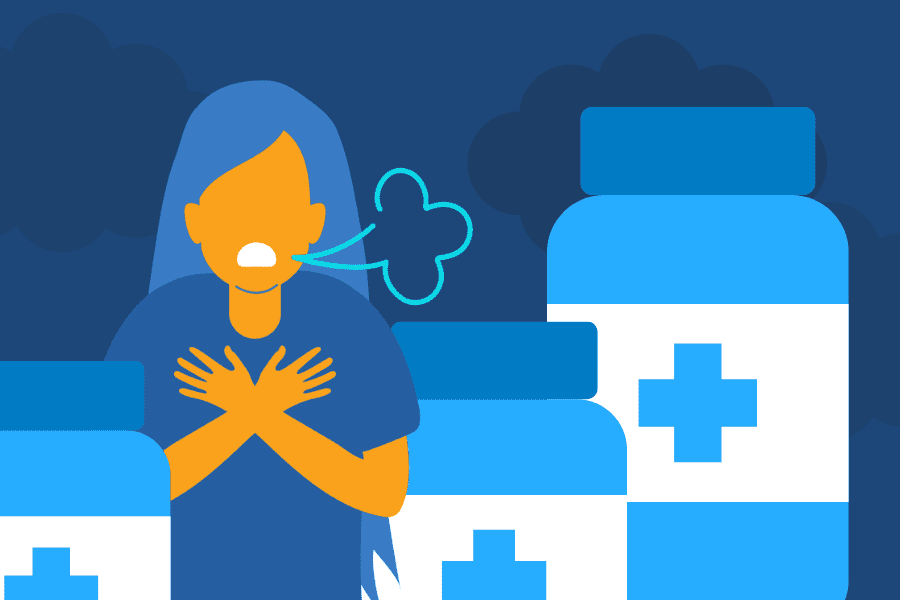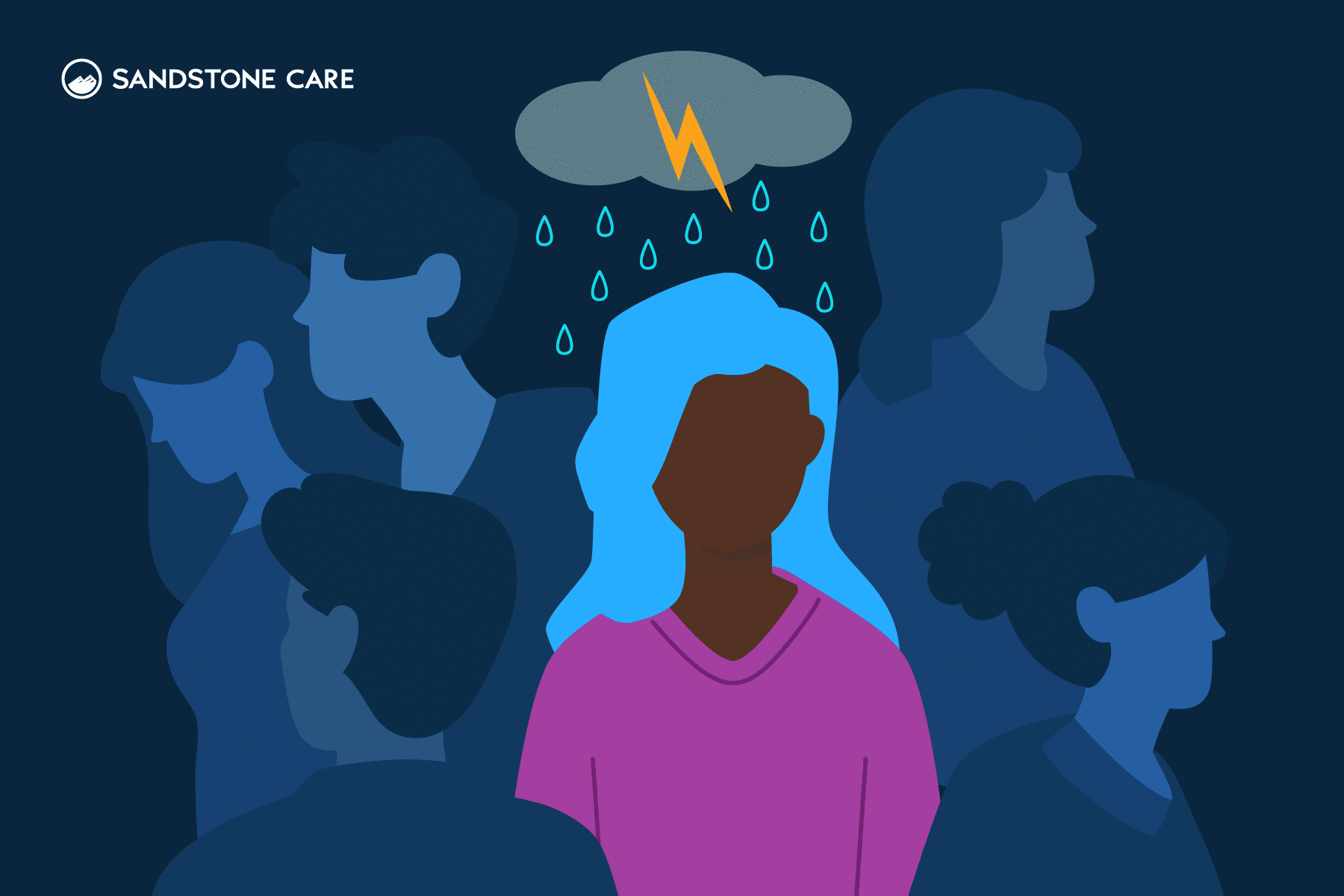Understanding Dextromethorphan (DXM)
What Is DXM?
DXM stands for a drug known as dextromethorphan, which is a cough suppressant that can often be purchased over the counter.
If you use it properly, this medication can help relieve a cough. Did you know that medications like this can do this by affecting the signal that your brain sends to the body that triggers you to cough?
DXM is often found in many common cold and flu medications like Robitussin, Delsym, or Nyquil. It comes in multiple forms, such as a cough syrup, a tablet, a capsule, or a lozenge.
Unfortunately, many people misuse DXM for recreational purposes to try to get high. The effects that this can lead to are often considered similar to the effects of the drug ketamine. However, because DXM is more accessible, many people may choose to misuse it instead.
Misusing DXM can lead to very dangerous side effects and can even be life-threatening. Although many people don’t realize this, this practice can also lead to addiction.
If you’re struggling with an addiction to DXM or any other kind of substance, our team at Sandstone Care is here to help.
What Is the DXM Drug Used For?
When used as it is intended, DXM can help treat a cough by temporarily suppressing it.
Some of the conditions it may be used to help treat include:
- The common cold
- Allergies or other kinds of throat irritation
- The flu
In some cases, DXM can also be misused for recreational purposes.
Where Is DXM Found?
DXM is found in many common over-the-counter cold and flu medications like Delsym, Robitussin, Tussin DM, Dayquil, and Nyquil.
Is DXM a Stimulant or Sedative?
While DXM is not technically a stimulant or a sedative, it can sometimes cause stimulant-like or sedative-like effects, depending on the dose you take and your own unique reaction to it.
For example, if you were to take a low or moderate dose of DXM, it is possible that you could experience some stimulant-like effects. This could include symptoms like a boost in energy, a sense of euphoria, and an increase in heart rate.
If you were to take a very high dose of DXM, it is possible that you would experience sedative-like or dissociative effects. This could include symptoms like detachment from reality, drowsiness, confusion, and, in some cases, even hallucinations.
Is DXM Addictive?
Yes, DXM can be addictive.
If you use it correctly and exactly as the instructions say, your risk of developing any sort of addiction to DXM would be low.
However, if you use it for recreational purposes, particularly in high doses, that risk is going to be much higher.
Drugs That Are Categorized as DXM
What Drugs Are Categorized as DXM?
DXM is one singular drug, not a category of drugs. However, many kinds of OTC medications contain DXM.
If you want to know if a certain cold or flu medication contains DXM, you can look for the label “DM” on the box. DXM is found in a lot of common cough syrups like Delsym, Robitussin DM, and Tussin DM. It is also found in certain tablets or capsules like Nyquil.
In many cases, products that contain DXM will also be mixed with other medications like acetaminophen, guaifenesin, antihistamines, and pseudoephedrine or phenylephrine.
Is DXM Cough Medicine?
Yes, DXM is a cough medicine that is intended to help reduce symptoms by calming the part of the brain the triggers the coughing reflex.
Since it is focused on working with the brain, rather than fighting the root cause of the cough itself, some people
Is DXM Like Benadryl?
DXM and Benadryl can cause similar effects but are two different kinds of products.
DXM is specifically designed to work as a cough suppressant. Benadryl is a brand name for the drug diphenhydramine. It works as an antihistamine to help with allergies, rashes, and itching.
While Benadryl will often make you sleepy, DXM will typically only have this side effect if it is taken in very high doses or if it is used in combination with other types of medicines.
It is typically more common for people to misuse DXM for recreational purposes than Benadryl.
Is DXM Mixed With Acetaminophen?
Yes, it is very common for DXM to be mixed with acetaminophen.
Both of these drugs are found in common over-the-counter cold and flu medications. DXM can help reduce your cough, while acetaminophen can help with fever, body aches, and other symptoms that you may experience when you’re sick.
How Much DXM Is in NyQuil?
At most stores, you’ll find several different kinds of NyQuil, and they may contain different amounts of DXM, depending on the specific type.
For example, Nyquil Cold and Flu, which is the original version of this product, contains 20mg of DXM. However, NyQuil Cough, which is a special formula, contains 30 mg of DXM.
DayQuil products do not contain any DXM.
Is DXM an Opioid?
No, DXM is not an opioid.
DXM comes from the same chemical family as some opioids, but it does not work the same way and does not cause typical opioid effects like pain relief or strong sedation when used as directed.
At normal doses, DXM simply helps reduce coughing. At high doses, it can cause dangerous side effects, including confusion, hallucinations, and loss of coordination. These effects are different from opioids but can still be harmful.
Dextromethorphan Side Effects
What Are the Common Side Effects of Using DXM?
The side effects that you can expect while taking DXM depend upon the dose and whether you’re taking it in combination with other medications.
This also depends upon whether you’re taking it as it is intended to be used or if you’re taking it for recreational purposes to try to get high. You’re likelihood of experiencing any noticeable side effects is going to be much lower if you’re taking it the way it is intended to be used.
The side effects you might experience while taking DXM as intended are usually pretty mild and don’t last long.
These side effects may include:
- Nausea or vomiting
- Lightheadedness
- Drowsiness
- Dizziness
- Mild disorientation or confusion
The side effects that you may experience if you misuse this drug for recreational purposes, especially in high doses, are likely to be more severe.
These side effects may include:
- Hallucinations
- Sudden mood swings
- A sense of euphoria
- Paranoia
- Rapid heart rate and high blood pressure
- Agitation
- Severe confusion
- Panic attacks
- Dissociation
- Loss of motor control
- Out-of-body experiences
How Long Does DXM Last?
The length of time that the effects of DXM last is going to depend on the dose you’re taking, whether you’re using it alongside other cold medications, and your specific metabolism and weight.
You will typically begin to notice the effects of DXM anywhere from 15 minutes to an hour after taking your first dose. If you’re taking between 10 and 30 mg, it should help suppress your cough for anywhere from about 4 to 6 hours.
If you’re taking a very high dose for recreational purposes, such as 100mg to 600mg or even more than that, you could still experience side effects for up to 12 hours after your last dose.
Why Does DXM Make You Sleepy?
DXM can, but does not always, make you sleepy if you take it in a small dose as it is intended to be used.
It is more likely to make you sleepy if you take it in high doses for recreational purposes. The reason this happens is that DXM affects both your serotonin and dopamine levels. These chemicals impact both your alertness and your mood and can make you feel more relaxed.
DXM can also make you sleepy if you’re using it alongside other flu or cold medications that contain active ingredients that cause drowsiness. An example of this could be chlorpheniramine, which is an antihistamine. Another common example would be doxylamine, which is found in NyQuil.
Does DXM Affect the Heart?
If DXM is taken in small doses, as it is intended to be used, any effect it may have on the heart is likely going to be minimal.
However, if it is taken in high doses for drug abuse and recreational purposes, this risk is going to be much higher. In this situation, the effects that it can have on the heart can be very dangerous and may include increased or irregular heart rate, high blood pressure, chest pains, and heart palpitations.
If you take DXM alongside certain other medications, the risk of it affecting your heart is going to be higher. This is particularly likely if you use it with ADHD meds, decongestants, and antidepressants.
There is an uncommon but very serious condition known as Serotonin Syndrome that can be experienced from too much serotonin in the brain. If you take an antidepressant containing serotonin on its own exactly as your doctor prescribed, your chances of experiencing this are probably going to be pretty slim. However, if you take an antidepressant alongside a very high dose of DXM, the risk is going to be higher.
Some side effects of serotonin syndrome may include:
- Agitation
- Confusion
- Muscle stiffness or twitching
- Fever
- High blood pressure
DXM Health Risks
What Are the Risks of Using DXM?
If you use DXM in low doses and as it is intended to be taken, the risks you may face are likely to be minimal.
However, if you take high doses of DXM, especially for recreational purposes, you could experience some major mental and physical health risks.
Some mental risks could include:
- Paranoia
- Psychosis
- Agitation
- Memory problems
- Dissociation
- Dependence
Some physical risks could include:
- High blood pressure and increased heart rate
- Liver damage
- Seizures
- Nausea or vomiting
- Loss of coordination
The longer you misuse DXM, the higher your risk will be of developing an addiction to it and experiencing other negative consequences. Once you develop an addiction to DXM, you may experience cravings when you try to cut back or quit using it.
These risks may be particularly high in teens or adolescents whose brains are still developing. Using this product along with alcohol or other powerful cough medications, such as codeine, will also increase these risks.
What Are the Short-Term Risks of Using DXM?
Some short-term risks of using DXM in low doses may include drowsiness, mild confusion, dizziness, and an upset stomach.
If you take it as a high dose, short-term risks could include memory loss, hallucinations, and disorientation.
What Are the Long-Term Risks of Using DXM?
Long-term risks of using DXM are likely if you misuse it by taking it in high doses.
These risks could include liver damage, worsened mental health, psychosis, and trouble concentrating.
Is DXM Addictive?
DXM (dextromethorphan) is not physically addictive in the same way as opioids or alcohol, but it can be psychologically addictive when misused.
Some people misuse DXM in high doses for its mind-altering effects, such as euphoria, hallucinations, or feeling detached from reality.
Over time, this can lead to dependence, where a person feels the need to keep using it, even though it is causing problems in their life. Misuse also increases the risk of dangerous side effects, overdose, and long-term health problems.
Can You Overdose on DXM?
Yes, you can overdose on DXM (dextromethorphan) if you take much more than the recommended dose. A DXM overdose can cause confusion, rapid heart rate, high blood pressure, breathing problems, and even comas.
DXM overdoses are more likely when the drug is mixed with other substances such as alcohol.
In severe cases, it can be fatal. If someone shows signs of a DXM overdose, call 911 or seek emergency medical help immediately.
DXM Use and Precautions
Who Should Not Use Dextromethorphan?
People who are taking certain medications such as MAO inhibitors or SSRIs such as sertraline or fluoxetine should not take DXM unless it has been cleared by a doctor.
Those who have liver damage, are under the age of 4 years old, have certain heart conditions, or have a history of substance abuse should not take DXM.
How Should I Use DXM?
You should only use DXM exactly as directed on the package or by a healthcare provider, measuring doses accurately and avoiding mixing it with alcohol, other drugs, or medicines.
Misusing DXM, such as taking more than recommended or using it to get high, can cause hallucinations, organ damage, and potentially life-threatening effects.
What Should I Tell My Healthcare Provider Before Using Dextromethorphan?
You should tell your healthcare provider about any other medications you may be taking, any allergies you have, whether you have a history of liver damage or heart problems, and whether you’re pregnant or breastfeeding.
They should also know if you have a history of seizures or if you have had problems with substance misuse in the past.
Finding Treatment for DXM Misuse
What Types of Treatment Options Are Available for DXM Misuse?
There are many different treatment options for DXM misuse, ranging from individual therapy to inpatient or outpatient treatment programs.
Cognitive behavioral therapy (CBT) can help treat DXM misuse because it can help you identify different negative thought or behavior patterns. Once you are more aware of these things, you can address them, and this can help you to avoid relapse.
What Should I Expect During Treatment for DXM?
What you can expect during treatment for DXM will depend on what type of treatment option you decide on.
Meeting and discussing treatment plans with your treatment provider ahead of time can help you to have a better idea of what to expect.
How Long Does It Take to Get Dextromethorphan Out Of Your System?
The length of time it takes to get DXM out of your system depends on the dose you took.
If you took a typical dose of around 10-30mg, it could take anywhere from 24 to 48 hours to be completely out of your system. If you take a high dose, it could take much longer.









